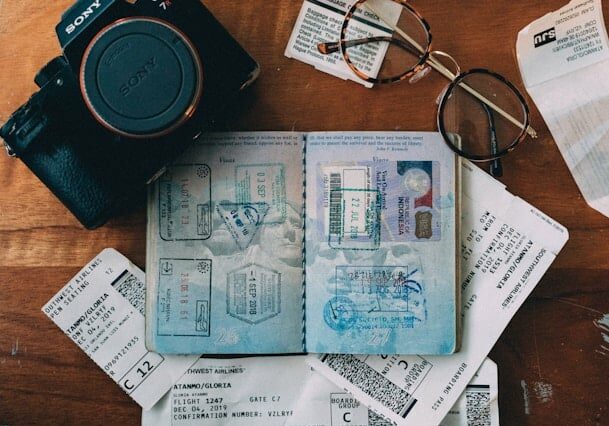What is dual citizenship?
Dual citizenship means you are legally recognized as a citizen of more than one country. This grants you rights and responsibilities in each country, such as the right to vote, work, access healthcare, and be protected by that country’s laws.
Some countries allow dual citizenship freely, others with restrictions, and some do not permit dual citizenship at all, like Japan, China and Oman.
Dual nationality is often used interchangeably with dual citizenship. If you’re speaking in legal terms, nationality refers to the bond between the individual and the state, while citizenship refers to the full scope of rights and duties.
How Dual Citizenship Can Be Acquired
The following are the most common pathways to take to obtain dual citizenship or even multiple citizenship:
- Citizenship by Birth (Jus Soli): Countries like the United States and Canada grant automatic citizenship to those born on their soil.
- Citizenship by Descent (Jus Sanguinis): Many Latin American and European countries, such as Ireland and Italy, allow individuals to claim citizenship based on ancestry or family lineage.
- Citizenship by Naturalization: After fulfilling residency requirements, individuals may apply for citizenship. For example, Portugal allows naturalization after five years of legal residency.
- Citizenship by Investment (CBI programs): Program example include St Kitts and Nevis Citizenship by Investment and Vanuatu Citizenship by Investment (also known as the Development Support Program) offer citizenship to individuals who invest in their national development or economies.
- Citizenship by Marriage: In countries like France or Spain, marrying a citizen can lead to expedited naturalization.
Countries That Allow and Do Not Allow Dual Citizenship
Many countries comprehensively recognize dual citizenship, while others permit it only in particular circumstances or for specific individuals. Here is a list of the countries that allow and do not allow dual citizenship.
Please note that the list is not exhaustive.
Country | Allow Dual Citizenship | Conditions or Exceptions |
Afghanistan | No | A former citizen of Afghanistan who was displaced due to political instability or war and acquired new citizenship may hold “unofficial” Afghan citizenship. |
Albania | Yes | |
Algeria | Yes | |
American Samoa | Yes | |
Andorra | No | Citizens of Spain are permitted dual citizenship |
Angola | Yes | |
Antigua and Barbuda | Yes |
|
Argentina | Yes | Citizens of reciprocal countries can obtain dual citizenship in Argentina, |
Armenia | Yes | |
Australia | Yes |
|
Austria | No | Austria typically prohibits dual citizenship, except in special circumstances, such as for individuals who acquire another nationality at birth or those granted special permission. |
Azerbaijan | No | |
Bahamas | No |
|
Bahrain | No |
|
Bangladesh | No | Bangladeshi nationals and their children with foreign citizenship must apply for a Dual Nationality Certificate. |
Barbados | Yes |
|
Belarus | No |
|
Belgium | Yes |
|
Belize | Yes | |
Benin | Yes | |
Bhutan | No | |
Bolivia | Yes | |
Bosnia and Herzegovina | Yes | Permits dual citizenship if there is a bilateral agreement between the two states. |
Botswana | No | Dual citizenship allowed until 21 years age. |
Brazil | Yes | |
British Virgin Islands | Yes |
|
Brunei Darussalam | No | Dual citizenship permitted until 18 years old. |
Bulgaria | Yes |
|
Burkina Faso | Yes |
|
Burundi | Yes |
|
Cambodia | Yes | |
Cameroon | No | Dual citizenship permitted until 21 years old. |
Canada | Yes |
|
Cape Verde | Yes |
|
Central African Republic | Yes |
|
Chad | N/A |
|
Chile | Yes |
|
China | No |
|
Colombia | Yes |
|
Comoros | Yes |
|
Costa Rica | Yes |
|
Croatia | Yes |
|
Cuba | No |
|
Cyprus | Yes |
|
Czech Republic | Yes |
|
Democratic Republic of the Congo (Kinshasa) | No | Dual citizenship permitted until 21 years old. |
Denmark | Yes |
|
Djibouti | Yes |
|
Dominican Republic | Yes |
|
Dominica | Yes |
|
East Timor | Yes |
|
Ecuador | Yes |
|
Egypt | Yes |
|
El Salvador | Yes |
|
Equatorial Guinea | Yes |
|
Eritrea | No |
|
Estonia | No |
|
Eswatini | No |
|
Ethiopia | No |
|
Fiji | Yes |
|
Finland | Yes |
|
France | Yes |
|
Gabon | N/A |
|
Georgia | No | Allowed only when a foreign president grants citizenship based on exceptional merit. |
Germany | Yes | No restrictions as of June 2024. |
Ghana | Yes |
|
Greece | Yes | |
Grenada | Yes | |
Guatemala | Yes | |
Guinea-Bissau | Yes | Permits dual citizenship if emigration was motivated by economic factors. |
Guinea | N/A | |
Guyana | No | |
Haiti | Yes |
|
Honduras | Yes | Allows dual citizenship if a treaty exists with that country. |
Hong Kong | Yes |
|
Hungary | Yes |
|
Iceland | Yes |
|
India | No | India does not allow dual citizenship in the traditional sense but the Government of India offers the Overseas Citizenship of India (OCI) card to Persons of Indian Origin (PIOs) who have acquired citizenship of another country. |
Indonesia | No |
|
Iran | No |
|
Iraq | Yes |
|
Ireland | Yes |
|
Israel | Yes |
|
Italy | Yes |
|
Ivory Coast | Yes |
|
Jamaica | Yes |
|
Japan | No | Japan does not allow dual citizenship. Individuals with multiple nationalities must choose one before reaching the age of 22. |
Jordan | Yes |
|
Kazakhstan | No |
|
Kenya | Yes |
|
Kiribati | No |
|
Kosovo | Yes |
|
Kuwait | No |
|
Kyrgyzstan | Yes |
|
Laos | No |
|
Latvia | Yes |
|
Lebanon | Yes |
|
Lesotho | No | Dual citizenship permitted until 21 years old. |
Liberia | No | Dual citizenship permitted until the age of maturity. |
Libya | No |
|
Liechtenstein | No |
|
Lithuania | Yes | Permits dual citizenship only in certain circumstances. |
Luxembourg | Yes |
|
Macau | Yes |
|
Madagascar | No |
|
Malawi | No | Dual citizenship permitted until 22 years old. |
Malaysia | No |
|
Maldives | No | |
Mali | Yes |
|
Malta | Yes |
|
Marshal Islands | Yes | |
Mauritania | No |
|
Mauritius | Yes |
|
Mexico | Yes |
|
Micronesia | No | Dual citizenship permitted until 18 years old. |
Moldova | Yes | |
Monaco | No |
|
Mongolia | No |
|
Montenegro | No | Allows dual citizenship only if a bilateral treaty exists with the other country. |
Morocco | Yes |
|
Mozambique | Yes | |
Myanmar, Burma | No | |
Namibia | Yes |
|
Nauru | Yes | |
Nepal | No | Nepal strictly prohibits dual citizenship. Acquiring a foreign nationality results in the automatic loss of Nepali citizenship. |
Netherlands | No | The Netherlands generally does not allow dual citizenship, requiring individuals to renounce their previous nationality upon naturalization. Exceptions exist, such as for those who cannot renounce their original citizenship or for spouses of Dutch citizens. |
New Zealand | Yes |
|
Nicaragua | Yes |
|
Nigeria | Yes | Allows dual citizenship for Nigerian citizens by birthright. |
Niger | Yes |
|
North Korea | No | |
North Macedonia | Yes |
|
North Macedonia | Yes |
|
Norway | No | Allows dual citizenship if original nationality cannot be relinquished. |
Oman | No |
|
Pakistan | Yes | Allows dual citizenship only if a bilateral treaty exists with the other country. |
Palau | No | Dual citizenship permitted until 21 years old. |
Palestine | N/A |
|
Panama | Yes |
|
Papua New Guinea | Yes | |
Paraguay | Yes | Dual citizenship allowed for citizens by birth or ancestry where an international treaty exists. |
Peru | Yes |
|
Philippines | No |
|
Poland | Yes |
|
Portugal | Yes |
|
Qatar | No |
|
Republic of Congo (Brazzaville) | Yes |
|
Romania | Yes |
|
Russia | Yes |
|
Rwanda | No |
|
Samoa | Yes |
|
San Marino | No |
|
Sao Tome and Principe | No |
|
Saudi Arabia | No |
|
Scotland | Yes | |
Senegal | N/A | |
Serbia | Yes |
|
Seychelles | Yes |
|
Sierra Leone | Yes |
|
Singapore | No | Singapore does not permit dual citizenship. Citizens who acquire another nationality may lose their Singaporean citizenship. |
Slovakia | No |
|
Slovenia | Yes | Allows dual citizenship for citizens by birth or descent. |
Solomon Islands | No | Dual citizenship permitted until 18 years old. |
Somalia | Yes |
|
South Africa | Yes | While South Africa allows dual citizenship, citizens must apply for and obtain permission to retain their South African citizenship before acquiring another nationality. |
South Korea | Yes |
|
South Sudan | Yes |
|
Spain | Yes | Dual citizenship allowed for citizens of Latin American countries, Andorra, the Philippines, Equatorial Guinea, or Portugal, or for Spanish citizens by birthright their second citizenship within three years of acquiring it. |
Sri Lanka | Yes | An Application for Retention must be submitted to be eligible for dual citizenship. |
St. Kitts and Nevis | Yes |
|
St. Lucia | Yes |
|
St. Vincent and the Grenadines | Yes |
|
Sudan | Yes |
|
Suriname | No |
|
Sweden | Yes |
|
Switzerland | Yes |
|
Syria | Yes | |
Taiwan | Yes |
|
Tajikistan | Yes | Dual nationals will only be considered citizens of Tajikistan. |
Tanzania | No | Allows dual citizenship until 18 years old. |
Thailand | Yes |
|
The Gambia | Yes |
|
Tibet | Yes |
|
Togo | No |
|
Tonga | Yes |
|
Trinidad and Tobago | Yes | Allows dual citizenship only for citizens of Trinidad and Tobago by birthright. |
Tunisia | Yes |
|
Turkey | Yes | |
Turkmenistan | No |
|
Tuvalu | N/A | |
Uganda | Yes | |
Ukraine | No |
|
United Arab Emirates | No |
|
United Kingdom | Yes |
|
United States | Yes |
|
Uruguay | Yes |
|
Uzbekistan | No |
|
Vanuatu | Yes |
|
Vatican City | Yes | |
Venezuela | Yes |
|
Vietnam | Yes | |
Yemen | Yes | Dual citizenship requires prior permission. |
Zambia | Yes | |
Zimbabwe | Yes | Dual nationality allowed only for citizens by birthright. |
Tax and Legal Considerations of Dual Citizenship
Dual citizenship does not exempt individuals from financial or civic obligations. Here are some important considerations:
- Tax residency: Some countries, like the US, tax citizens on worldwide income regardless of country of residence. Others only tax based on physical presence or domicile.
- Double taxation treaties: Countries often have agreements to prevent double taxation on the same income. These tax treaties are especially important for high-net-worth individuals (HNWIs) and professionals that travel worldwide frequently.
- Military service: Countries like South Korea and Israel, for example, require military service from all male citizens, even if they reside abroad.
- Renunciation of citizenship: Some countries, such as Germany or the Netherlands, may require renunciation of the original nationality unless specific exceptions apply.
Property Ownership and Dual Citizenship
As a dual national, property ownership is generally allowed and your status can even potentially expand your rights to own property across multiple countries. Here are key points to consider:
Advantages of property ownership as a dual citizen
- Full property rights in both countries: As a dual national, you are typically allowed to purchase, own, and inherit property without restrictions in either of your countries of citizenship.
- Bypass foreign ownership restrictions: Some countries impose limitations on property purchases by foreigners. Holding citizenship can exempt you from these restrictions as you will no longer be a foreigner.
- Ease of financing and registration: Dual citizens may have better access to local financing options, lower property transfer taxes, or more favorable inheritance laws.
Exceptions and considerations
- Restricted zones: Even citizens may face restrictions in certain strategic or military zones (for example, in some parts of Thailand or India).
- Tax implications: Dual nationals may be subject to capital gains taxes, inheritance taxes, or property taxes in both countries depending on tax treaties and residency status.
- Residency requirements: In a few countries, owning property may be easier or carry more benefits (like fast-track residency) if you live there a minimum number of days per year.
Travel Benefits of a Second Passport
Holding two or more passports can significantly increase global mobility. Dual citizens often enjoy:
- Visa-free access to more countries.
- Entry rights into both countries of citizenship.
- Ability to live and work freely across more regions like the European Union (EU).
For example, dual citizens of an EU country and a Latin American country are able to access both the Schengen Area and South America’s MERCOSUR (Argentina, Brazil, Paraguay, Uruguay, and Bolivia) bloc without the need for additional visas.
When you get a second passport, it also serves as a backup option in times of political instability, restrictive travel bans, or limited consular support.
Regional Trends in Dual Citizenship Laws
“The Transformation of Citizenship” report from Global Intelligence Unit has discovered instances of dual or multiple citizenship allow countries of origin countries to benefit significantly through strengthened diaspora networks as these tend to foster economic growth and cultural exchange.
Dual citizens often maintain strong ties to their home countries, sending remittances that play a crucial role in supporting local economies. These remittances surpassed $800 billion globally in 2023 alone.
- Europe: Many EU countries now permit dual citizenship (for example, France, Ireland and Portugal), while others like Austria remain restrictive. Sweden and the Netherlands have eased rules in recent years.
- Asia: Dual citizenship is generally prohibited. Exceptions do exist in places like the Philippines and Pakistan but only under certain conditions.
- Latin America: Dual citizenship is becoming widely accepted, especially when acquired through descent or naturalization. Argentina, Mexico, and Colombia are notable examples.
- Caribbean: Several countries actively promote dual citizenship through Citizenship by Investment programs, for example:
Furthermore, the Global Residency and Citizenship by Investment (RCBI) Report highlights the growing importance of investment migration programs. These programs, including Citizenship by Investment (CBI) and Residency by Investment (RBI), offer pathways to obtain dual citizenship, providing enhanced mobility, tax optimization, and quality of life benefits.
United States and Dual Citizenship
The United States does not formally forbid people to be dual citizens. However, US citizens must:
- File annual tax returns and disclose foreign assets under FATCA (Foreign Account Tax Compliance Act).
- Fulfill Selective Service registration if male and age-eligible.
- Use a US passport when entering or exiting the United States.
US citizens who naturalize in another country do not automatically lose their citizenship, but intentional renunciation must be done through a formal process with the Department of State.
How Can Global Citizen Solutions Help You?
Global Citizen Solutions is a boutique migration consultancy firm with years of experience delivering bespoke residence and citizenship by investment solutions for international families. With offices worldwide and an experienced, hands-on team, we have helped hundreds of clients worldwide acquire citizenship, residence visas, or homes while diversifying their portfolios with robust investments.
We guide you from start to finish, taking you beyond your citizenship or residency by investment application.

Frequently Asked Questions about Dual Citizenship
Can I be a citizen of three countries at once?
Yes, it is possible to be a citizen of three or more countries, depending on the laws of each nation involved. Some countries permit multiple citizenships without limit, while others have restrictions.
How do I know if my country permits dual citizenship?
You can check with your country’s immigration or interior ministry or consult its nationality laws. Countries typically outline dual citizenship policies in their constitution or citizenship acts.
Can dual citizenship be revoked by any country?
Yes, some countries reserve the right to revoke citizenship if it was obtained fraudulently or if a citizen voluntarily acquires another nationality in violation of national laws.
What are the disadvantages of dual citizenship?
Disadvantages may include double taxation, conflicting laws, mandatory military service, travel restrictions between your countries of citizenship, and potential difficulty obtaining security clearances or certain government jobs.
Which countries disallow dual citizenship?
There are a few countries that do not allow dual citizenship. Here is a list of countries that do not grant dual citizenship:
- Bahrain
- Malaysia
- Qatar
- Singapore
How does dual citizenship affect taxes?
Tax obligations depend on each country’s rules. Some countries tax based on residence, others on citizenship. For example, U.S. citizens have to pay taxes on worldwide income regardless of where they live, even if they hold dual nationality.
Can I travel freely with dual citizenship?
Dual citizenship can offer more visa-free travel options by allowing you to use the passport that provides the greatest mobility. However, you may need to enter and exit countries using the passport of that country if you are a citizen there.
Does the UK allow dual citizenship?
Yes, the UK allows dual citizenship. This means British citizens can legally hold one or more additional nationalities without losing their British citizenship.
There are no restrictions on the number of nationalities you can hold, making UK dual citizenship a flexible and attractive option for those with multicultural backgrounds, global careers, or family ties abroad.
Can I apply for dual citizenship through marriage?
Yes, many countries offer accelerated naturalization or dual citizenship pathways through marriage to a citizen, though timelines and requirements vary. You may still need to meet residence or language criteria.
Do I need to declare dual citizenship when traveling?
In most cases, you are not required to declare dual citizenship when entering a third country, but you may need to follow specific procedures when entering or leaving one of the countries you’re a citizen of. Always travel with both passports.
Are children born abroad granted dual citizenship?
Often yes, but it depends on the nationality laws of both the country of birth and the parents’ countries. Many countries offer citizenship by descent, while some grant automatic citizenship based on birthplace (jus soli).
Does dual citizenship mean dual nationality?
While often used interchangeably, “nationality” refers to legal allegiance to a state, while “citizenship” includes the full set of civil rights and responsibilities. In most contexts, dual citizenship and dual nationality mean the same thing.
Can I lose my citizenship if I acquire a second one?
Yes, some countries do not permit dual citizenship and may automatically revoke your original nationality upon acquiring another. Always check the laws of both countries before pursuing a dual citizenship.
How does dual citizenship affect voting rights?
Dual citizens often retain the right to vote in both countries, but eligibility depends on national laws. Some countries allow overseas citizens to vote, while others require residency. You may also be obligated to participate in both electoral systems.
Is property ownership allowed if you're a dual citizen
Yes, you can own property as a dual citizens, and in many cases, having dual nationality can expand your property ownership rights across multiple countries.
Can you have Canadian citizenship and US citizenship simultaneously?
Yes, you can have both Canadian and US citizenship simultaneously. Canada fully permits dual citizenship while the United States permits dual nationality but does not formally encourage it. US citizens who naturalize in another country (like Canada) are not required to give up their US citizenship, unless they do so voluntarily throughformal renunciation.

 Dual citizenship, also called dual nationality or multiple citizenship, is when a person is legally recognized as a citizen of two countries simultaneously.
Dual citizenship, also called dual nationality or multiple citizenship, is when a person is legally recognized as a citizen of two countries simultaneously.
